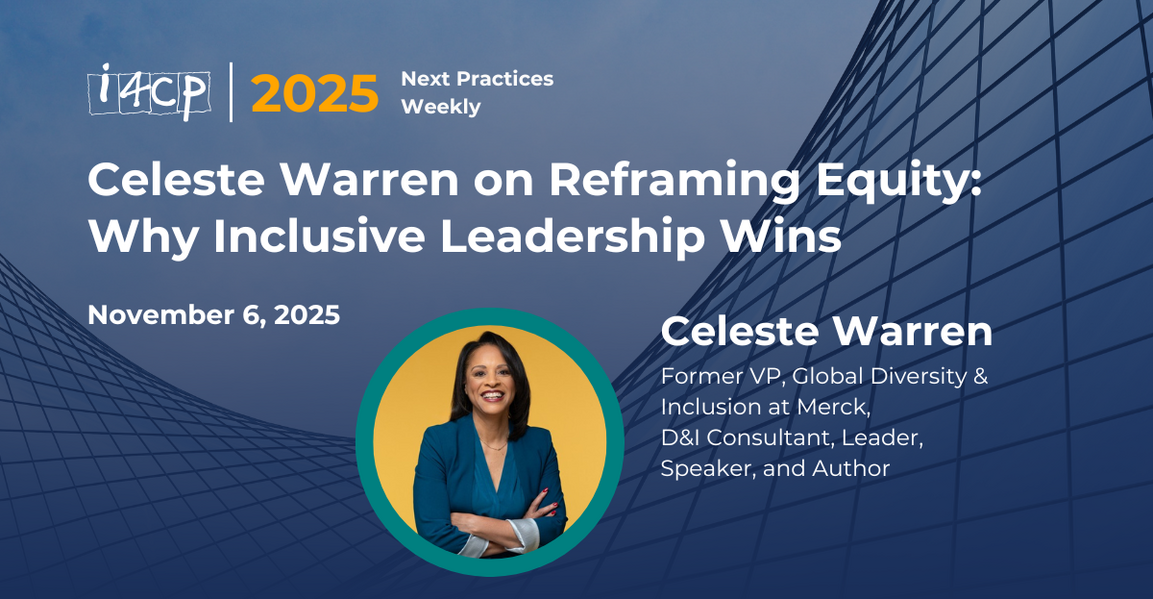L&D's Role at BMS - Race Relations, a Pandemic, and Acquisitions - 10/22/20
This week’s Learning and Development action call hosted special guest Judy Kelley, Head of Global Growth and Development at Bristol-Myers Squibb. Martin was interviewed by i4cp CEO and co-founder Kevin Oakes. Here are some highlights from the call:
Impact on organizational culture from going remote. While BMS does have some employees who did not start working remotely in spring (e.g., research scientists and those in manufacturing), most of the company did make the switch. As other organizations have experienced, Kelley noted some interesting changes she has seen such as increased authenticity of leaders, including some leaders now doing videos on Fridays that are a mix of personal and professional updates. Also, the integration of their massive acquisition of Celgene has been aided in some ways, as everyone had to change in the same way together, so many legacy BMS and legacy Celgene ways of doing things fell away quickly.
Culture is critical during any major M&A event. As i4cp's recent research made clear, focusing on culture is critical to the success of any merger/acquisition (i4cp members can see the report Avoid Acquisition Acrimony: How to Analyze Culture Synergy Early). For the BMS acquisition of Celgene, one area of focus has been collaboration across the leadership team, where they've taken time to really focus on team effectiveness. Both organizations were mature and so had established company values. But it was important to ask what are the new, combined company values? The leadership team worked on this, and then rolled them out and focused on one each week to employees. A key to making the integration work has been 600 volunteer culture change champions, the on-the-ground leaders of culture change. The enterprise L&D team has enabled them with a toolkit of short documents and other resources, and there are leader-led sessions that have also provided guidance.
Learning culture and a focus on managers is key. BMS is similar to Microsoft in having a learning culture, an organization of learn-it-alls, not know-it-alls, with a particular focus as noted above on patient outcomes. Psychological safety is key here to drive innovation, to take good risks, etc. An employee's relationship with their manager is critical to strike the right balance, as is having strong processes and procedures as safeguards to work within. Kelley noted that BMS makes a differentiated investment in their 7,000-strong manager population, really focusing on the skills needed to support their teams. Live manager forums are one approach they take for this, with around 3,500 usually attending live and others watching the recordings.
BMS has made a major commitment to health disparities and diversity. BMS has been quite public in their response to diversity, equity, and inclusion matters in 2020, as DEI is a key part of their culture. In August, combined with the Bristol Myers Squibb Foundation, BMS announced a $300 million combined investment that will focus on five areas: addressing health disparities; increasing clinical trial diversity; expanding their supplier diversity program; expanding their U.S. Employee Giving Program; and increasing their workforce diversity.
In addition, almost half of BMS employees belong to PBRGs (People and Business Resource Groups). I4cp research has found that leadership in such groups can be a key development tool, especially for diverse leaders in an organization (i4cp members can see the report The Untapped Power of Employee Resource Groups). BMS goes further than this by making leaders of their PBRGs apply for the job and making it a full-time position. It is temporary and people rotate in and out of the role, often then moving on to higher leadership positions in the organization.
In addition to this recording, please see the i4cp Coronavirus Employer Resource Center for new research and next practices to help address the COVID-19 pandemic.




